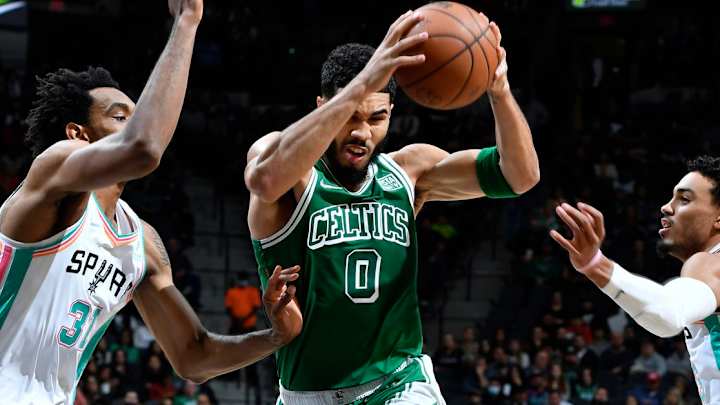Facing Familiar Problems, the Celtics Must Develop the Discipline to Break Their Bad Habits

In their loss to the San Antonio Spurs on Saturday, offensively, the theme of the first quarter for the Boston Celtics was to shoot after the first pass of the possession, miss, and have to get back to set up their defense on the fly. That method of operation resulted in the Celtics missing 15 of their first 16 field goals. They finished the first frame with 14 points on 5/26 shooting.
That style of play drew the ire of Ime Udoka. When speaking with the media after the game, he called out the Celtics starting perimeter players, Marcus Smart, Dennis Schroder, Jaylen Brown, and Jayson Tatum, saying they “need to learn how to play together, not just try to get baskets for themselves.”
“Guys are trying to find their rhythm instead of playing together,” the Celtics first-year head coach said after the game, “and that’s what it looks like to me in the first quarter at times. Everybody is worried about their game and getting themselves going, instead of what’s best for the team and playing together. When we do that, it’s very apparent that we are different offensively.”
Too often in the first quarter, Boston settled for shots it could get at any point in the possession. It is one of the bad habits the team is having a hard time breaking, compounded by the Celtics rotation mostly having inconsistent shooters.
Continuing his criticisms for how his team played in the first frame, Udoka said: “We knew they were a team that switches everything, and we just held the ball and tried to do it by ourselves. No ball movement, no penetration for your teammates. In the second quarter, third quarter and the fourth, it was night and day from that. (We) talk about teams that switch everything; it’s not always for you. Get your teammates involved.”
As was the case against the Brooklyn Nets on Wednesday night, the Celtics shook off their bad habits and got themselves back in the game. They are living up to their potential defensively, getting the stops necessary to fuel runs that help them dig out of the holes their offense keeps putting them in. On Saturday, the contributions they got from their second unit also played a critical role in Boston erasing what at one point was a 24-point deficit. That group chipped in 23 points, played well on both ends -- Enes Kanter, who finished the game with a plus-minus rating of +28, had one of, if not the best defensive performance of his career -- and made plenty of hustle plays.
After the game, Grant Williams, who has emerged as one of the most valuable members of the green and whites second unit, said: "We’re a great counterpunch team. But imagine if we were able to knock somebody out in the first round and continue to knock them out throughout and make sure they’re not getting up. That’s something we have to be better at." Williams went on to say: "We’re not ever that team that, next thing you know, you look up, then, dang, it went from 20 to 40 just like that. You look at teams across the league in the past couple of years, you look at teams like the Bucks, you look at teams like the Warriors of the past, you look at teams like the Spurs of the past, they play like you knew that -- especially on their home court -- you weren’t getting a win. And then, on the road games, you would have to fight for that. Right now, we’re in that up-and-down flow, rather than them saying like, ‘OK, you’re playing the Boston Celtics.’ And that’s the team you’re playing against.”
Williams buys into how his head coach wants this team to play. When their best players take to that style, they're consistently getting in and around the paint, the ball moves, players are active, and the Celtics overcome their lack of reliable shooters. It's a formula that creates energy, gets everyone involved in the offense, and leads to higher-quality looks. That translates to an easier time scoring, which also benefits a Boston defense that gets more opportunities to set up against an opponent forced to take the ball out from under its basket.
The problem is, as the Celtics work to mature beyond their bad habits, they tend to revert to an iso-heavy approach and quickly settle for the first decent look they get. It's why after taking a seven-point lead with 3:21 left, Boston didn't score the rest of the game as the Spurs went on a 15-0 run to rally for the win.
When speaking with the media after the game, Tatum said: “I guess being in my position, you’ve got to take it on the chin. A lot of people look to you for, I guess, why certain things happen. And we’re going through a little bit of adversity right now, losing two in a row and a game we should’ve won, and I’m fine with that. I’m fine with, I guess, being the reason or the blame guy. It doesn’t bother me at all. Understand it’s a long season, but we’re going to figure it out. I’m certain of it."
The Celtics still have 62 games, plus practice time when they can fit it into their schedule, to grow into an offensive attack that consistently plays how their head coach demands of them. However, the problems plaguing them aren't new. Neither are the glimpses of playing the style that allows this team to evolve into its best version. The question remains, whether the Celtics are making or missing shots, can their best players develop the discipline to consistently play a team-oriented, aggressive, energetic brand of basketball. No matter the circumstances, that approach is their best path to success.
